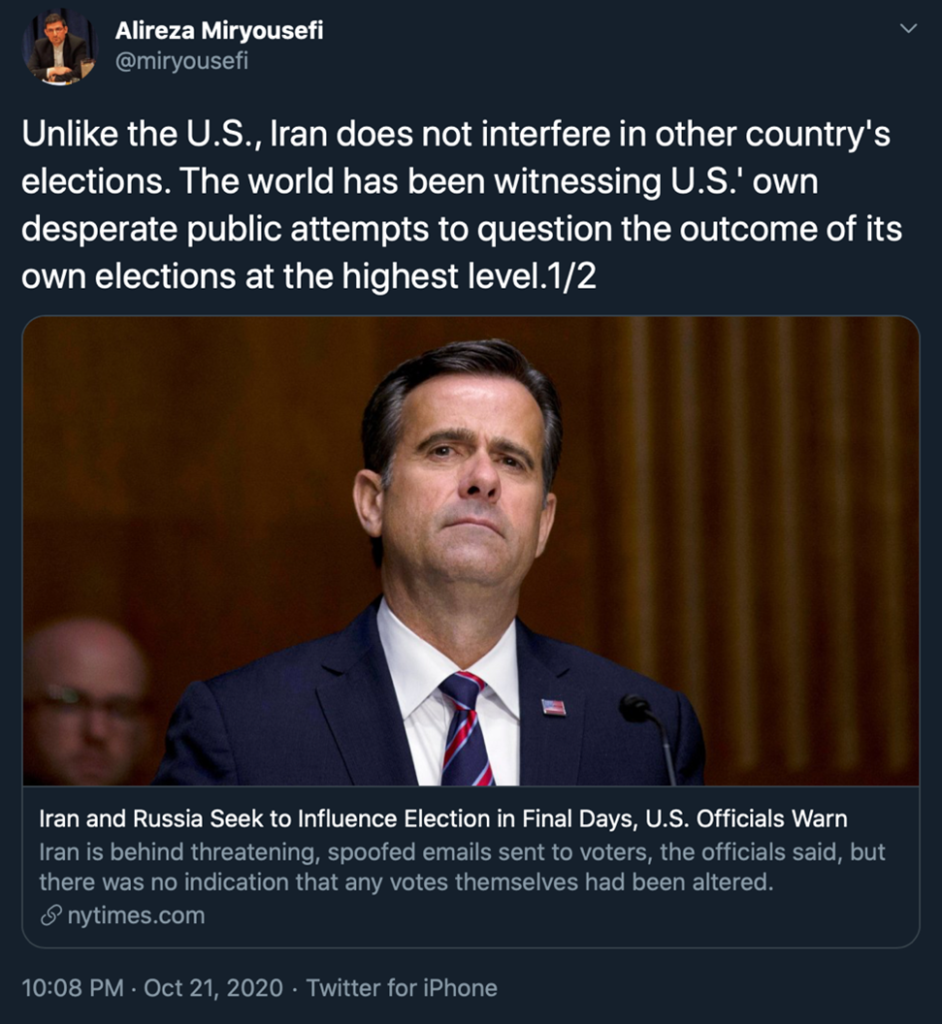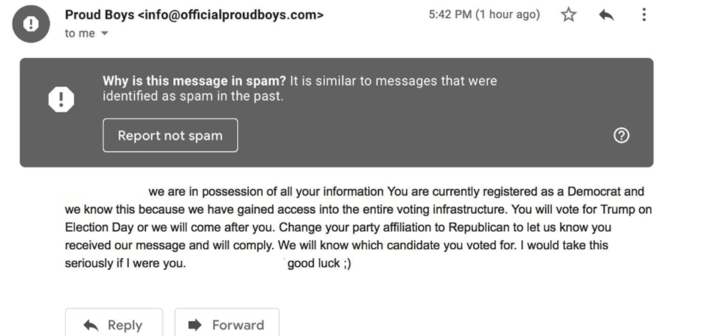By: Cameryn Williams, Social Media Manager
When checking her Gmail on October Oct. 20, FSU student Jane Smith* wasn’t expecting to be faced with a threatening message encouraging her to switch parties to vote for current President Donald Trump.
“This is scary,” Jane Smith wrote, right after sharing it with her Facebook to share with her friends and family, “I just checked my Gmail’s spam folder and indeed have two different emails like these.”
Fortunately, Jane Smith is not the only Alachua voter who received a message like this, implying that these messages were sent out through a code, rather than anyone capable of harming her.
“I wasn’t concerned for myself because it was clearly a flimsy intimidation tactic,” she said in an interview, “but I know how easily this could convince people who are less digitally literate.”
Jane Smith moved across Florida in 2019 and knew she hadn’t updated her information regarding her address.
“People less familiar with how to spot scams and spam messages could have been negatively affected,” said Smith. When asked if her mind would have changed if the email included her new address, she replied, “I’d definitely be more freaked if it was somewhere I still lived.”
Voters throughout Florida, Alaska, Arizona, and Pennsylvania have been targeted by emails claiming to be the Proud Boys. They claim to have gained access to the entire “‘voting infrastructure,”’, while sharing things that are unfortunately public information.
Florida, Arizona, and Pennsylvania are considered swing states, while Alaska has the lowest population density of any state, having less than two2 residents per square mile. While the email address was shown to be info@officialproudboys.com, metadata – obtained through tracing the email – shows that some emails were actually sent from an Estonian email server.
U.S. officials accused Iran and Russia of targeting American voters with menacing emails without specific evidence. The Iranian Mission to the United Nations’ spokesman, Alireza Miryousefi, condemned the allegations as “absurd.”
Later, Miryousefi tweeted, “Iran has no interest in interfering in the U.S. election and no preference for the outcome. The U.S. must end its malign and dangerous accusations against Iran.”
The surrounding culture of fear of foreign countries may not be fully unfounded, however. The Internet Research Agency (IRA), based in St. Petersburg, Russia, created several thousands of social media accounts pretending to be Americans supporting various radical political groups. Between 2013 and 2017, millions of Americans were reached by groups like this. After the Crossfire Hurricane investigation, the Federal Bureau of Investigation (FBI) concluded that Russia did, in fact, attempt to interfere with the election.
Trump dismissed FBI Director James Comey in the midst of the investigation with Russia. Now, FBI Director Christopher A. Way is leading the investigation into where these emails originated. Enrique Tarrio, the chairman of the Proud Boys in Miami, denies any involvement with these emails. According to an interview with Fresh Take Florida, Tarrio says the Proud Boys are cooperating with the FBI.
Estonia, the country that the emails were located in, gained its independence from the USSR in 1991. However, this doesn’t mean the country doesn’t still have influence from Russia.
An article written by the Pulitzer Center says that Estonia isn’t quite off Russia’s hook, despite its independence.
“The country is afraid to do anything that would provoke Russians, who stand only a two-hour drive away from its capital, Tallinn,.” according to the Pulitzer Center.
Estonia is not so far away from the minds of the director of national intelligence John Ratcliffe, and FBI Director Christopher A. Wray, who still believe that Iran and Russia were involved. The information that was sent to Americans did not need to be hacked or taken off the deep web – it’s public record.
“Florida absolutely needs more secure public information laws,” Jane Smith said. “Having information easily accessible contributes to this.”
*Jane Smith is an anonymous, fake name to protect the real Jane’s identity. 





